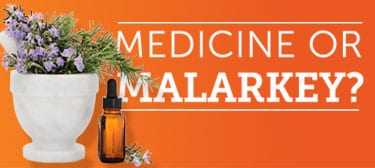Medicine or Malarkey: Do Essential Oils Really Heal?
July 16, 2015

If you know anyone who sings the praises of the healing powers of natural medicines, no doubt you’ve heard the term “essential oils.” Essential oils refer to substances extracted from roots, stems, bark, flowers, or any part of a plant. Common essential oils used for cosmetic or healing purposes include eucalyptus, chamomile, frankincense, lemongrass, lavender and more. Some essential oils have been even been associated with treatment for anxiety and depression.
While there is not conclusive scientific consensus on the benefits of many essential oils, there is certainly no shortage of opinions on the matter (try a Google search for innumerable results). Some decree them a cure-all for anything that might ail you. The other camp remains skeptical, worried that essential-oil based products are essentially snake oil, sold by opportunists exploiting the “natural healing” craze. Can they really help anxiety or depression?
Studies have indicated that lavender-oil massages can reduce anxiety and lower blood pressure. Also, putting a few drops of lavender in boiling water for inhalation may assist with headaches, depression or insomnia. As of 2014, Germany has approved lavender as a legitimate medicinal substance for treating anxiety. Generally, lavender has the most scientific research (of the essential oils) that suggests its ability to calm and relax.
Orange essential oil is often used in aromatherapy for its pleasant scent and calming powers. A recent study conducted on children ages 6-9 before undergoing dental treatment showed that orange oil aroma had positive results in reducing stress and anxiety.
Bergamot oil, derived from its bitter fruit, has long been championed for its calming and mood-elevating effects via aromatherapy. A study in 2011 on rats suggests that it may have medicinal properties and reduce actions that indicate stress. However, it should be noted the same study begins on the premise that bergamot is “used widely in aromatherapy to reduce stress and anxiety despite limited scientific evidence [to-date].”
“Are essential oils and aromatherapy are a suitable replacement for traditional medical treatments?”
Standard medical treatment for serious conditions may not eliminate all symptoms, and in those cases aromatherapy can be used in conjunction to help manage symptoms and pain. This does not mean aromatherapy should be used as a replacement for conventional treatments and antibiotics. Consult your doctor before using essential oils regularly. When dealing with moderate to severe anxiety and depression, it’s best to work with a mental health professional to determine the best course of treatment.
“Essential oils can only be beneficial — so there’s no harm in trying them out, right?”
Make sure you don’t fall victim to this assumption. Just because it’s “natural” doesn’t mean it’s risk-free. You might have a reaction to certain essential oils applied topically if you have sensitive skin, or you might be allergic to specific oils. Many essential oils can be toxic if ingested. Use of essential oils can also cause unwanted drug interactions (consult a medical professional before using).
Aromatherapy and essential oils certainly have helped people with anxiety and depression. And if they bring you relaxation and relief, you should certainly not stop using them (if you’re doing it safely). However, there is still not enough scientific research available on the medicinal properties of most essential oils out there — certainly not enough to suggest they should replace antibiotics. So take any information about their all-healing powers with a grain of salt. Be sure to consult your primary care physician or specialist in mental health before building them into your treatment regimen.
